Last updated on March 30th, 2024
Featured image: A Peregrine Falcon / Photo by harrycollinsphotography on Envato
How we can help keep raptors safe from extinction
By Rupi Mangat
Darcy Ogada is fixated by raptors, the hunters on the wing. As director of The Peregrine Fund-Africa, her work is all about saving the raptors – from the Amur falcon to the mighty African crowned eagles – and also the vultures that most people don’t see as raptors.
Raptors include predatory eagles, owls, vultures, and falcons and play a crucial role in maintaining healthy ecosystems and benefits to the environment, human health, and economies. Across East Africa, these birds of prey are facing many important threats including poisoning, habitat loss, electrocution on power lines, collisions at wind farms, and persecution.
Mass poisoning events in retaliation for livestock loss are killing many more vultures and eagles than their intended victims, lions and hyenas, and are decimating vulture populations. The loss of these species is having a devastating effect on savanna ecosystems, and, if left unchecked, could lead to species extinction, ecosystem collapse, and increased threats to human wellbeing.
Q&A with Darcy Ogada about raptors
What is the breadth of biodiversity in Kenya’s raptors?
Kenya has incredible wildlife diversity, including its bird of prey, or raptors. Kenya has 92 species of raptors, representing 17% of the world’s raptors. From eagles, vultures, hawks, falcons, harriers, owls, etc,
Kenya has a huge wealth of raptor species and a large number of migrant species visit seasonally from as far away as eastern Russia and China (Amur Falcons).
Sadly, Kenya also has the highest number of threatened raptors in the world with more than 20 species at risk of extinction.
Why are raptors facing extinction?
Unfortunately, Kenya’s raptors are under increasing threat and many species are declining in numbers. We recently completed a study that examined the population trends of 22 savanna raptor species over 40 years. 86% of species had declined by a median of 70%. The biggest decline was seen in one of Africa’s most iconic and unique birds, the Secretarybird, which declined by 94%.
All of Kenya’s vultures and large eagles are under threat, but what was even more surprising was the loss of once common, medium-sized raptors such as Augur Buzzard and Long-crested Eagle. I’ve witnessed this decline first-hand over the past 20 years and now many raptors are quite rare and can only be seen inside national parks.
Why are raptors important?
Raptors help to control pests, such as rodents in farms and insect outbreaks. Many species, such as small migratory falcons, are adapted to travel across the landscape in search of large pest outbreaks, which they help to control.
Vultures are nature’s most highly evolved scavengers. They rapidly locate and consume carcasses that might otherwise attract species like dogs or coyotes that are not as well adapted for scavenging and that are known to spread diseases such as rabies, which could be transmitted at carcasses.
Owls should be appreciated for their role as farmer’s friends. Barn owls can eat up to 12 mice per night!
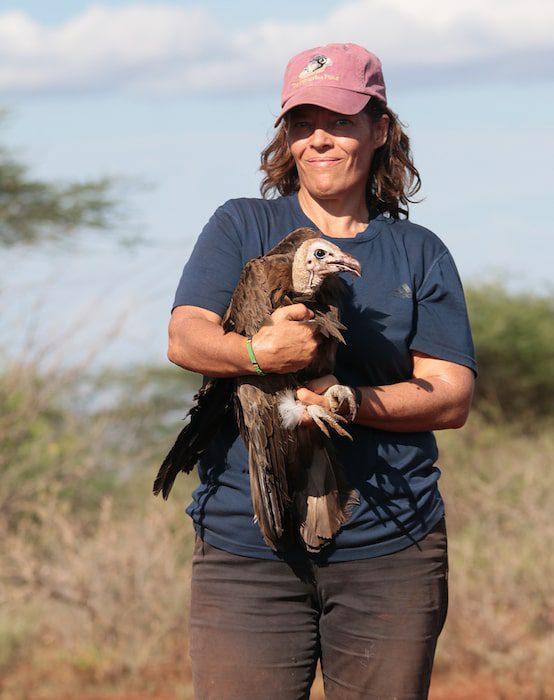
Darcy about to release a Hooded Vulture that has just been tagged / Photo by M. Odino
Tell us about your recent work with raptors?
We co-lead a project called the Coexistence Co-op, which aims to reduce predator conflict and the subsequent poisoning of wildlife in northern Kenya. This project has been very successful in training local communities to construct predator-proof ‘bomas’ or livestock corrals, which protect vulnerable livestock from nighttime attacks by lions, leopards and hyenas.
We also train people about the importance of predators and scavengers, and about the dangers of using pesticides to poison wildlife. Since 2018 our project has trained over 5000 people who have built over 700 predator-proof bomas to protect their livestock. The project has substantially reduced wildlife poisoning incidents in the areas where we work.
The Peregrine falcon is the fastest bird on Earth. What’s the story behind it?
Peregrines are uniquely adapted for speed as they hunt prey, mainly other birds, by aerial pursuit, including their famous high-speed dives at speeds of over 300 kph! They are strong and powerful fliers that sound like a fast-approaching 747 airplane.
It’s also where my organization gets its name. The Peregrine Fund was founded in 1970 by a small group of passionate biologists and falconers who helped to restore U.S. populations that were facing imminent extinction due to the widespread spraying of DDT for insect control. Studies identified that DDT bioaccumulated in predators, like Peregrines, and caused their eggshells to become weak and crack prematurely, hence they were not able to produce young. Once DDT was banned in the early 1970s Peregrine Falcon populations rebounded across the U.S.
What’s your favourite raptor and why? What draws you to raptors?
I don’t have a single favourite raptor, but as a group, it’s owls.
What’s not to love about them! They are unique in their nighttime foraging and hooting. Because of this, they have unusual adaptations including silent flight so as not to be heard by their prey, which are mostly alerted to a hunting owl by sound, rather than by sight.
In many countries, owls are feared and persecuted because of local cultural beliefs. They are the underdogs of the raptor world that need human champions to explain their benefits to mankind, such as rodent and insect control.
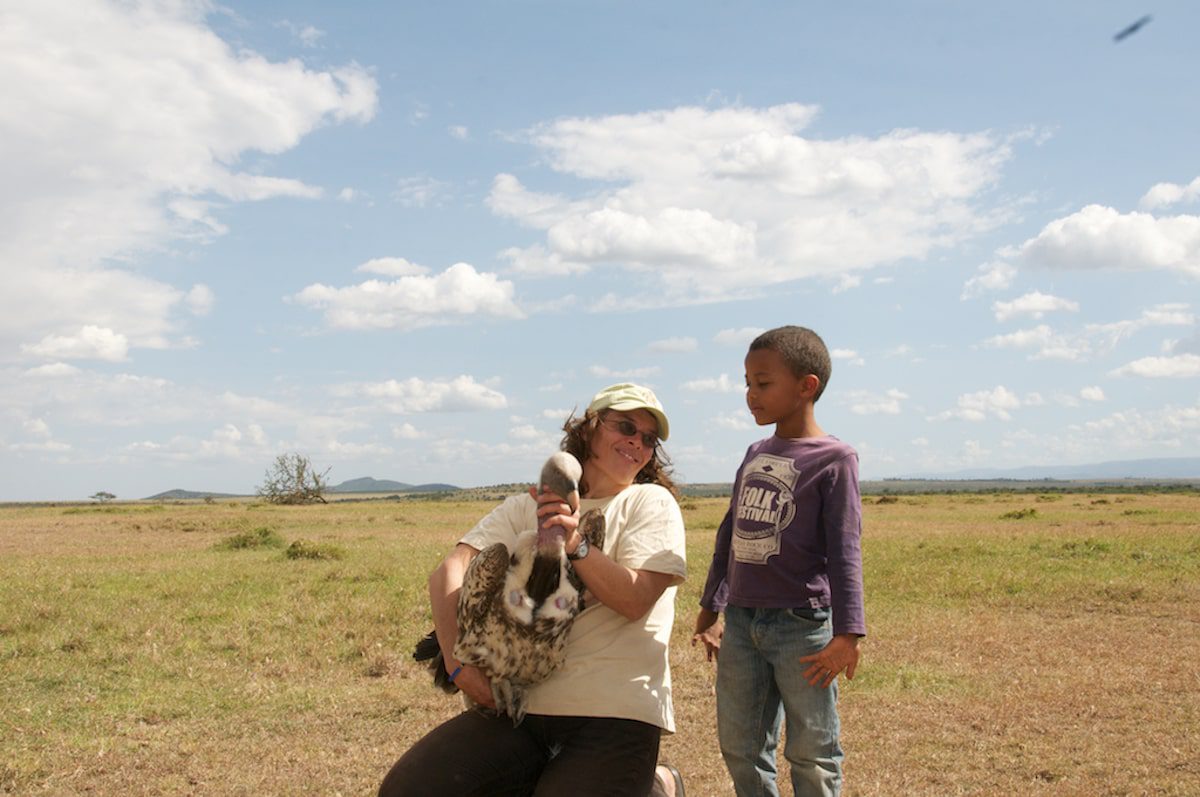
Darcy and her son Franco about to release a tagged Ruppell’s Vulture | Photo by S. Kapila
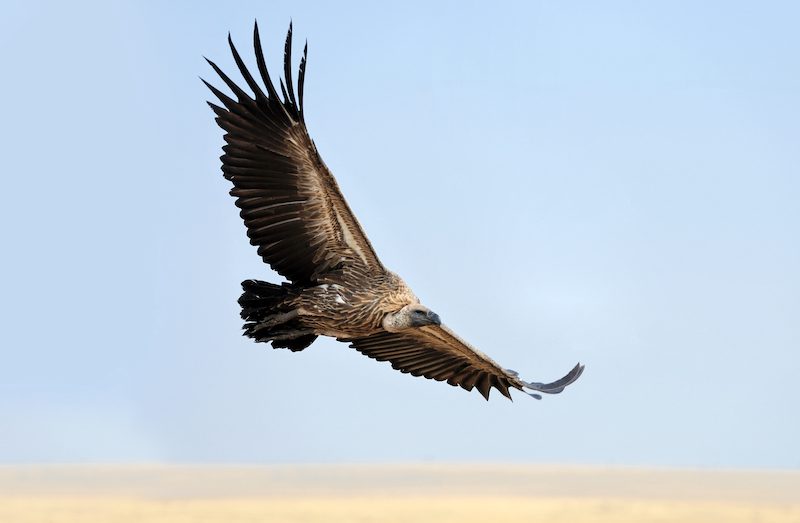
Kenyan vulture / Photo by byrdyak on Envato
You’ve satellite tagged some raptors. Why? And where are they flying to?
We’ve tagged vultures as part of efforts to understand where and how far they move, and to be alerted in case a tagged bird dies so we can respond immediately to try to determine the cause of death.
Vultures are among the farthest ranging African wildlife species. They range far wider than elephants or lions. Many are regularly ranging across international borders, making conserving these critically endangered species very challenging.
All of Kenya’s vultures are highly threatened by poisoning and mostly this is as a result of farmers losing their livestock to large predators, such as lions and hyenas, and then retaliating by sprinkling the remaining carcass with highly toxic pesticides to kill the offending predator, but inadvertently killing tens to hundreds of innocent vultures that rapidly descend to feed on carcasses.
What are some of the biggest threats to raptors and what must countries do to keep raptors safe?
Destruction of their habitat, due to logging, production of charcoal, human encroachment and infrastructure development. They are also highly threatened by poisoning, both intentional and unintentional.
Raptors are persecuted because some species kill chickens and lambs, or they are despised, such as owls. One of the most rapidly growing threats to raptors worldwide is electrocution and collision with energy infrastructure, such as when they inadvertently perch on unsafe power poles and get electrocuted, or they collide with the spinning blades of wind turbines. Learning about the various threats to raptors and becoming their champions is one of the best ways to help save them.
In the wild, what must we NOT do when we see raptors?
Remember that raptors are the top predators of the sky and as such it is important not to disturb them or approach them too closely such that they fly away. They spend hours every day trying to hunt prey to stay alive and disturbing them may mean the day’s meal has been lost.
It’s also important to recognize if a raptor needs help. Increasing threats mean that our raptors are more at risk than ever. If you see a bird that doesn’t fly off the ground when it should, or seems lethargic or otherwise hurt, please immediately alert the relevant authorities. In Kenya and many other countries there are raptor rescue and rehabilitation facilities that are qualified to care for these injured birds. If help is hours away then throw a towel or blanket over the bird to calm it and pick it up safely by securing its legs and talons in one or both hands. Placing it in a large box will help to keep it calm while in transport to a rehab facility.
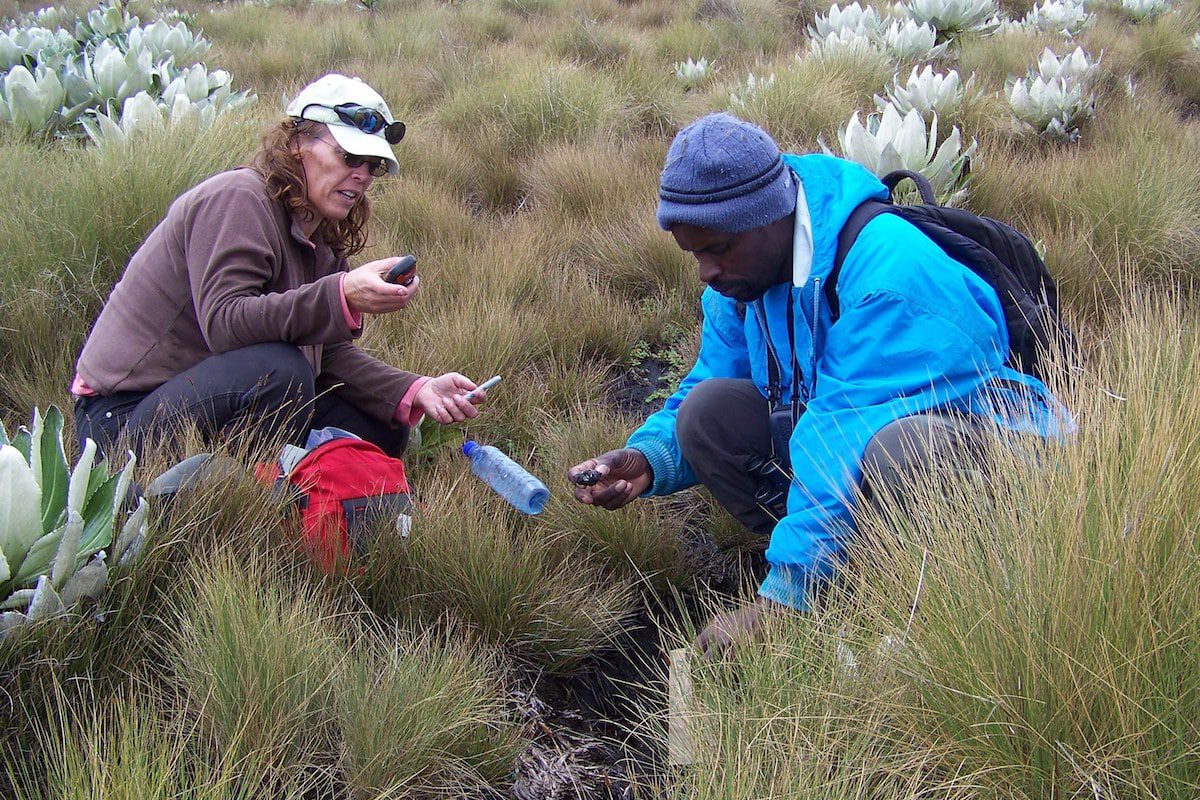
Darcy and Paul Muriithi, a Peregrine Fund student searching for the Abysinnian Owl on Mt Kenya. A species that hasn’t been seen in Kenya since the 1970s. / Photo provided by Darcy Ogada
Any funny, dangerous moments with raptors?
Yes, I once got bit on the butt by a jackal that got caught in our noose trap at the same time as our targeted vulture. I was securely holding the vulture on my lap. The jackal got noosed around its neck and was doing high-speed laps around us.
As my trapping partner lunged in to grab the jackal it got scared enough to lash out at me and my butt! Eventually, all parties walked/ran/flew away safe and sound.
What’s your hope for the future?
That we can change human behaviours soon enough to save species, and ourselves.
How you can help the raptors
Donate. Even a small donation can make a big difference.
Adopt a raptor. You’ll help provide food, enrichment, travel, and medical care for one of our raptor ambassadors at the World Center for Birds of Prey. These hard-working members of our staff inspire thousands of people to engage in conserving birds of prey.
Celebrate Vulture Awareness Day. Every year, the first Saturday of September is dedicated to celebrating vultures all over the world.
Shop sustainably. When buying bags, shoes, souvenirs or other articles, be sure they are not made of wildlife products and that, if made of natural products, they are sustainably harvested.
Travel Sustainably. Traveling with local companies that support conservation, visiting countries that most need tourism money, and using your travel as an opportunity to meet and get to know locals are great ways to support conservation.
Learn and Teach. Learn as much as you can about vultures and other birds of prey then share what you have learned with friends and family.
Read More From Africa
10 Women-Friendly Places to Stay in Cape Town, South Africa (From Women Who Live There)
Recommended places to stay in Cape Town South Africa, from our Women’s Travel Directory, including boutique, luxury and well-known hotels.
JourneyWoman Webinar Series: Less-Travelled Africa for Women With Experts
Join our April 23 webinar to learn more about where to go in Africa, featured on our “30 Less-Travelled Places for Women to Travel in 2024.”
10 Books to Inspire Travel to South Africa
In preparation for JourneyWoman’s 30th Anniversary expedition trip in November 2024, we’ve curated 10 books about South Africa for curious travellers.

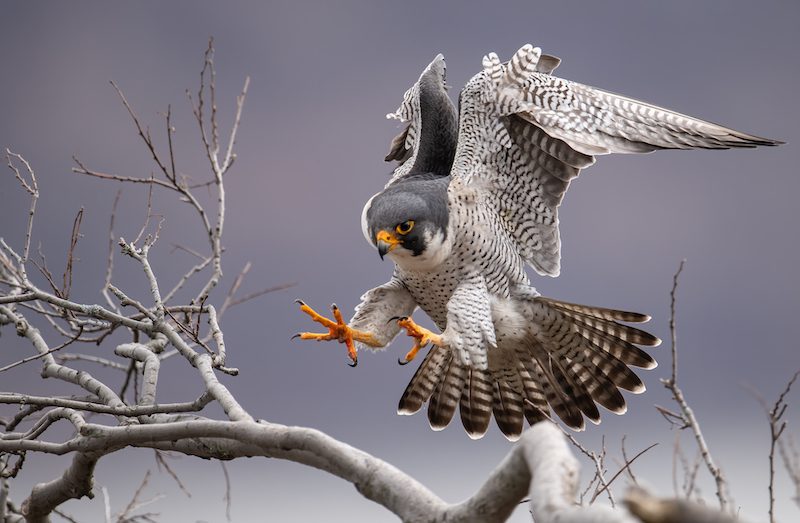



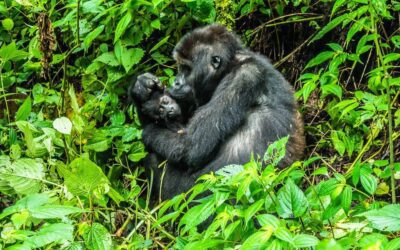
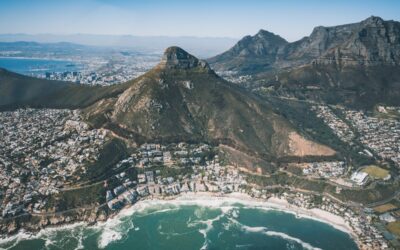
0 Comments
We always strive to use real photos from our own adventures, provided by the guest writer or from our personal travels. However, in some cases, due to photo quality, we must use stock photography. If you have any questions about the photography please let us know.
Disclaimer: We are so happy that you are checking out this page right now! We only recommend things that are suggested by our community, or through our own experience, that we believe will be helpful and practical for you. Some of our pages contain links, which means we’re part of an affiliate program for the product being mentioned. Should you decide to purchase a product using a link from on our site, JourneyWoman may earn a small commission from the retailer, which helps us maintain our beautiful website. JourneyWoman is an Amazon Associate and earns from qualifying purchases. Thank you!
We want to hear what you think about this article, and we welcome any updates or changes to improve it. You can comment below, or send an email to us at [email protected].